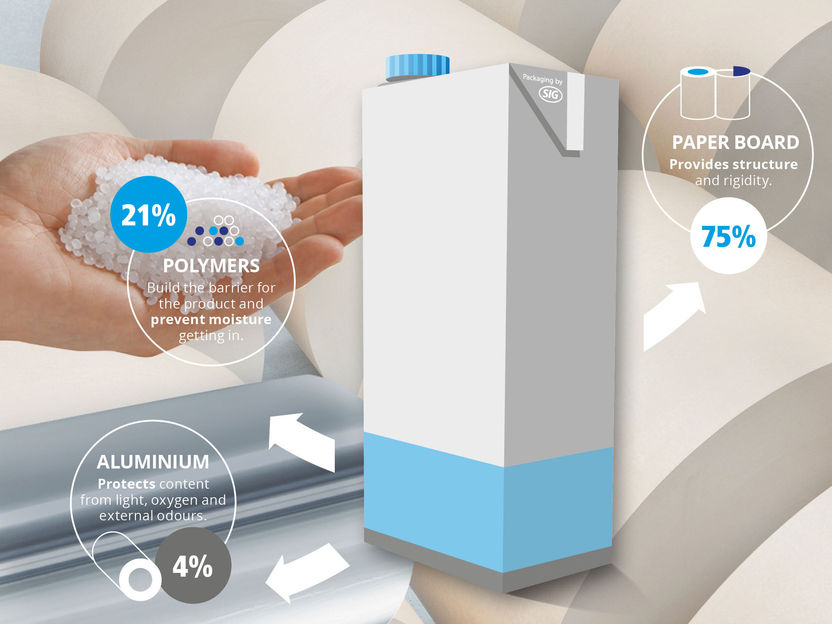SIG and Amcor push responsible aluminium sourcing further
Following its responsibility approach entitled WAY BEYOND GOOD, SIG is committed to sourcing 100% of its direct materials from only certified sources. Working together with value chain partner Amcor, the partnership aims to assure that the aluminium foil supply chain is working towards the performance standard of the Aluminium Stewardship Initiative (ASI, https://aluminium-stewardship.org/). Amcor, a global leader in responsible packaging, is one of SIG's main suppliers for aluminium in Europe.

SIG
A razor-thin aluminium layer is used in most of SIG’s carton packs to protect the food from light, oxygen and external odours.
The new ASI performance standard reveals principles that must be met along the supply chain of aluminium and covers the main sustainability risks and potential impacts such as significant energy use and the release of greenhouse gases in the process to converting bauxite ore into aluminium, impacts on local communities and natural habitats from mining, and the potential for water pollution from production waste.
ASI has recently launched a new Certification programme for the aluminium value chain, which focuses on responsible production, sourcing and stewardship of this important industrial metal. The new program aims at addressing and reducing the impacts of aluminium production: from mines, smelters and casting to semi-fabrication and manufacture of products containing aluminium.
Both SIG and Amcor support ASI’s initiative as very effective in creating long-term consensus on standards. Such initiatives often take considerable time to be adopted throughout the industry, however, so to start this important work as early as possible SIG and Amcor engaged the trusted third party verification body DNV GL to conduct pilot assessments.
Collaborative approach
Dr Christian Bauer, Manager Environmental Affairs and Product Related Sustainability, of SIG said: “Our aim is clear. This is not a pass/fail exercise, but a collaborative approach to share industry best practices and ensure we are at the forefront of sourcing aluminium foil that will meet or surpass the ASI performance standards, ensuring continuous environmental improvement as well as best in class ethical practices.”
The pilot looks at the value chain of aluminium foil all the way to the bauxite mines and is intended to provide a snapshot of performance against the ASI Performance Standard. Dr Colin Morgan, Principal Consultant at DNV GL, said: “Engaging suppliers on improving sustainability performance from mine to manufacturing is a challenging task. We are proud to work together with SIG and Amcor to bring visibility over their supply chains, build capacity and help all stakeholders to get ready for ASI through our pilot audits. This is a pioneering approach to multi-tier engagement that delivers value and benefits for all involved.”
In 2017, collaborative assessments with value chain partners were completed in Europe and Asia for the manufacturing of aluminium foil and foil stock. The pilots provided a readiness check to close gaps against ASI standard requirements, and acknowledged any existing certifications the sites already have – ensuring a streamlined approach and value creation for everyone.
Dr Gerald Rebitzer, Sustainability Director at Amcor said: “What we found was that the performance of the assessed sites generally aligns very well with the requirements of the ASI performance standard, and we are already working with the suppliers to close any gaps. The results are very encouraging.”
At the forefront
In 2018, SIG and Amcor will go further down the value chain. With this ongoing program and the subsequent planned ASI certification, both SIG and Amcor are confident that they will be well prepared to be at the forefront of offering packaging with responsibly sourced aluminium foil. SIG has already been at the forefront of sourcing from responsibly managed forests with 100% of its liquid packaging board from paper mills with the FSCTM Chain of Custody certification and 89% made with wood from FSCTM certified forests (FSCTM trademark licence code: FSCTM C020428). Since 2017 SIG is also certified according to ISCC PLUS in view of sourcing of renewable feedstock for polymers.
This new collaboration with Amcor to push responsible aluminium sourcing further is another important step on SIG’s net-positive journey of going WAY BEYOND GOOD. The company is focusing on three core areas in which it can do the most for society and the environment, with responsibility at the centre of this: how SIG runs the company, sources its materials, and manufactures its products.































































